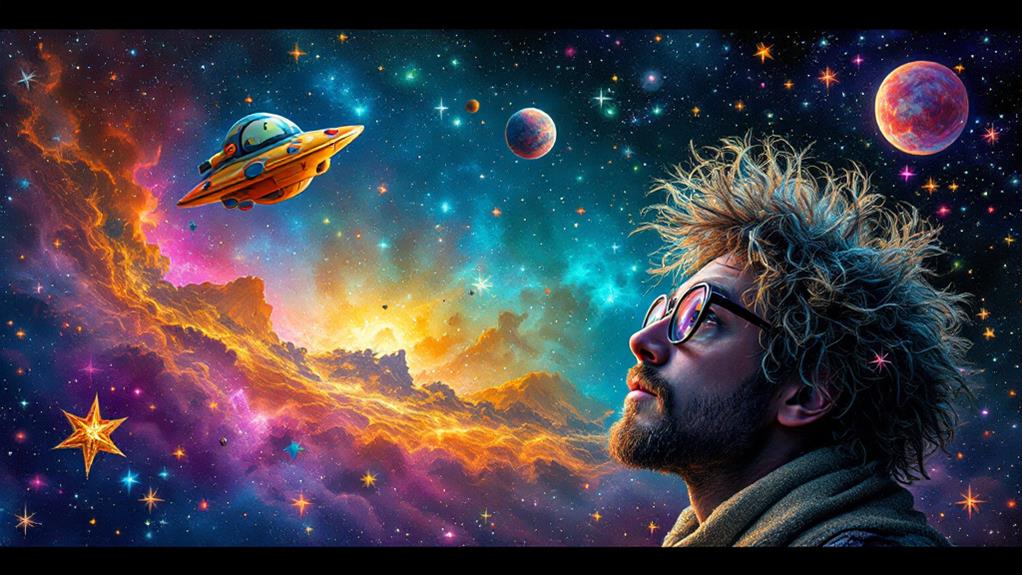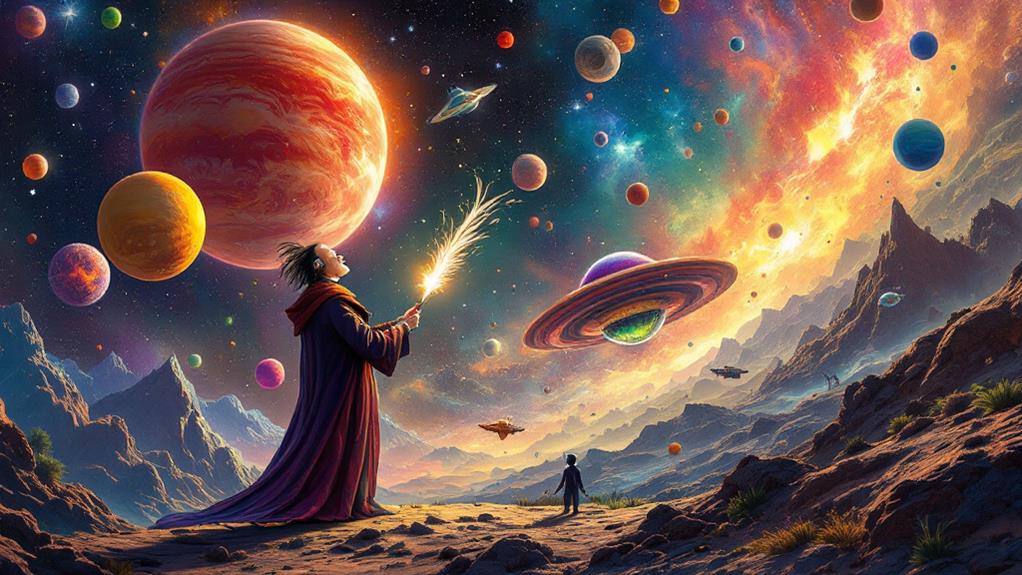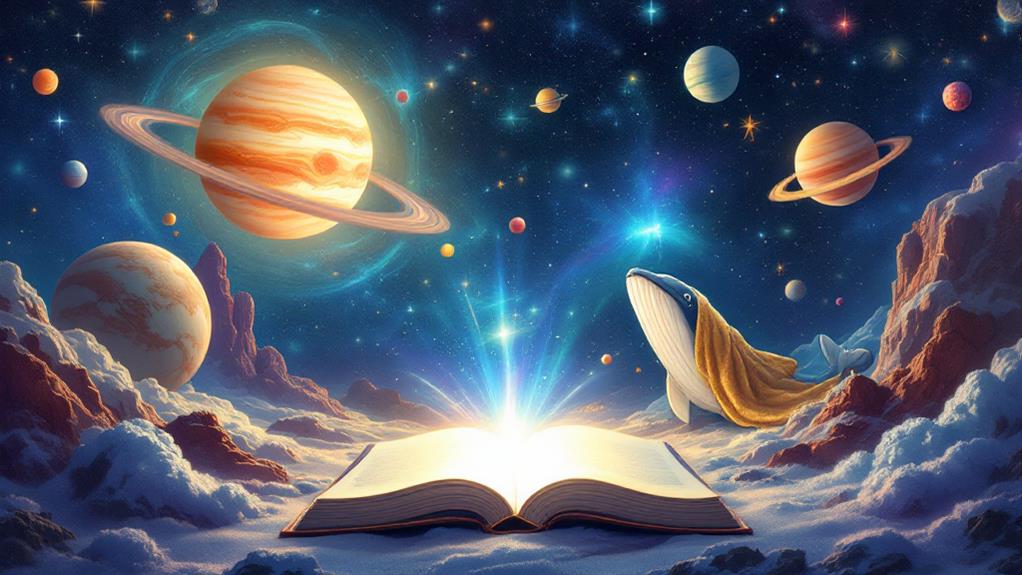Introduction to Douglas Adams: The Genius Behind The Hitchhiker’s Guide

Uncover the genius of Douglas Adams, the creator of "The Hitchhiker's Guide to the Galaxy." Born in Cambridge in 1952, Adams grew up in an environment rich in creativity and science. His unparalleled blend of humor and philosophical insight transformed science fiction. "The Hitchhiker's Guide" began as a radio play, engaging audiences with its absurd humor and existential musings. Adams' work influenced the genre by merging comedy with sci-fi, expanding beyond traditional storytelling. His lesser-known works, like "Dirk Gently's Holistic Detective Agency," highlight his versatile creativity. Learn more about Adams' unforgettable legacy throughout his storied career.
Early Life and Influences
Douglas Adams's early years were marked by a blend of curiosity and creativity that would later shape his unique storytelling style. Born in Cambridge in 1952, his family background provided a rich tapestry of influences. His mother, Janet, encouraged his imagination, while his father, Christopher, instilled a love for science and exploration. Growing up, Douglas was surrounded by books and ideas, fueling his inquisitive nature.
You would find that his educational influences played a significant role in honing his craft. At Brentwood School, Douglas's teachers recognized his talent for writing and humor. Here, he developed his knack for crafting witty narratives, a trait that would become a hallmark of his work. Later, at St John's College, Cambridge, he joined the Footlights, a renowned comedy group that included future stars like John Cleese. This experience was crucial, as it allowed him to refine his comedic timing and storytelling abilities.
Throughout his formative years, Douglas's family and education provided a fertile ground for his burgeoning imagination. These influences would later manifest in his writing, creating a legacy of humor and insight that continues to captivate readers today.
The Birth of a Phenomenon
The Hitchhiker's Guide to the Galaxy's creation marked a vital moment in science fiction history. Douglas Adams's unique blend of wit and imagination transformed how audiences engaged with the genre. His creative process, often fueled by last-minute bursts of inspiration, resulted in a writing style that was both humorous and thought-provoking. You couldn't help but be drawn into the absurdity and brilliance of his universe, where cultural references intertwined seamlessly with clever satire.
Adams's ability to connect with fans was unparalleled. He thrived on fan interactions, often incorporating feedback and suggestions, which only served to deepen the bond between his work and its audience. This relationship was a significant factor in the series' enduring popularity.
The Hitchhiker's Guide's success led to numerous media adaptations, each expanding its reach and influence. Regardless of whether through radio, television, or film, Adams's narrative proved versatile and enchanting across platforms. The story's adaptability guaranteed its place in pop culture, cementing Adams's position as a visionary.
In creating The Hitchhiker's Guide to the Galaxy, Douglas Adams didn't just write a book; he birthed a cultural phenomenon that continues to inspire and entertain fans worldwide.
Crafting the Hitchhiker's Universe

Crafting the Hitchhiker's universe required more than just a keen imagination; it demanded a deep understanding of how to weave humor with existential musings. When you immerse yourself in Douglas Adams' world, you're not just meeting quirky characters; you're exploring a universe intricately built to challenge your perspective on life, the universe, and everything in between. The world-building in "The Hitchhiker's Guide to the Galaxy" is thorough, inviting readers to traverse bizarre planets, each with its own intricate histories and peculiarities. Adams crafts these settings with precision, ensuring they serve as more than mere backdrops but as integral parts of the narrative.
Character development is at the heart of this universe. Adams introduces you to Arthur Dent, Ford Prefect, and Zaphod Beeblebrox, among others, each distinctly flawed and relatable. Their interactions and growth drive the story forward, offering insights into human nature and our place in the cosmos. You watch as Arthur, a bewildered Earthling, adapts to the absurdity around him, reflecting the bewilderment many feel in the face of an unpredictable universe. Through these characters, Adams masterfully combines personal experiences with the expansive cosmos, crafting a universe that connects on multiple levels.
Humor and Satire in Writing
When you plunge into the humor and satire in Douglas Adams' writing, you're immediately struck by its cleverness and depth. Adams masterfully blends absurdist humor with satirical commentary, creating a world where the improbable becomes the norm. His witty dialogue is filled with existential themes, poking fun at the human condition and our place in the universe. You can't help but laugh as he deftly critiques society, exposing its quirks and contradictions with a comedic timing that's both sharp and insightful.
Adams doesn't just rely on jokes for the sake of laughter; he uses humor as a tool for deeper reflection. Through his absurd scenarios and characters, he invites you to question reality and the often arbitrary structures that govern our lives. The social critique embedded in his stories makes you think critically about bureaucracy, technology, and human nature, all while keeping a smile on your face.
His writing style is a dance of words, where each sentence is crafted to surprise and amuse. The absurdity is never without purpose, and the satire is never without heart. By immersing yourself in Adams' world, you uncover that laughter truly is a profound way to investigate life's complexities.
Themes and Philosophical Insights

Engage yourself in the thematic depths of Douglas Adams' work, and you'll uncover a cache of philosophical insights woven seamlessly into his narratives. Adams' stories are more than just humorous escapades through the galaxy; they investigate absurdist philosophy, challenging the very nature of existence. You'll notice how he masterfully questions the meaning of life, the universe, and everything in between, using wit and irony to examine these existential questions.
Adams crafts a universe where the absurdity of life is laid bare. Characters like Arthur Dent grapple with the randomness of existence, embodying the struggle to find purpose in a chaotic cosmos. You're invited to reflect on your own life's meaning as Adams presents a world where traditional logic is constantly upended. Through his tales, he insists that the quest for knowledge and understanding is often met with absurdity and unpredictability.
His work encourages you to accept uncertainty and question preconceived notions. The famous "42" answer to life's ultimate question symbolizes the futility in seeking straightforward answers. Adams' blend of humor and philosophy offers a unique lens, urging you to ponder life's mysteries with an open mind.
Influence on Science Fiction
In the domain of science fiction, Douglas Adams' influence is both profound and far-reaching. You can see his impact in the way he challenged traditional storytelling through narrative experimentation. Adams boldly blended comedy and science fiction, a genre blending that was practically unheard of before his time. He showed that science fiction didn't have to be solely serious or speculative; it could be fanciful and humorous too. His unique approach opened doors for other writers to investigate new avenues and break free from conventional norms.
Adams' work encouraged authors to accept absurdity and wit, making room for creativity that defied standard expectations. You'll notice that his characters and plots often twist conventional sci-fi elements into something entirely unexpected, pushing readers to think beyond typical genre boundaries. This approach not only entertained but also invited introspection about the absurdities of life and the universe.
Lesser-Known Works and Projects

Douglas Adams' creative genius extended beyond his most famous work, "The Hitchhiker's Guide to the Galaxy." While you might know him primarily for this iconic series, Adams' portfolio includes a range of lesser-known projects that showcase his diverse talents. One such project is the radio play "The Hitchhiker's Guide to the Galaxy," which actually marked the beginning of the series before it became a book. Adams' knack for storytelling shone through in this medium, blending humor and science fiction in a groundbreaking way.
Beyond radio plays, Adams ventured into television adaptations, including his work on "Doctor Who." He served as a script editor and writer, contributing to the show's enduring legacy with memorable episodes like "City of Death." His ability to intertwine wit and narrative complexity made these stories standout pieces in the "Doctor Who" universe.
Adams also investigated detective fiction with his novel "Dirk Gently's Holistic Detective Agency," which combines mystery, science fiction, and humor. Although it didn't achieve the same fame as "The Hitchhiker's Guide," it remains a reflection of his versatility and creativity, further solidifying his status as a multi-talented writer.
Legacy and Cultural Impact
Few authors have left such an indelible mark on science fiction and popular culture as Douglas Adams. His unique storytelling techniques, blending absurd humor with philosophical insights, have captured the imaginations of readers worldwide. You can't mention Adams without acknowledging the devoted fan community he inspired. Fans of "The Hitchhiker's Guide to the Galaxy" have kept his work alive through fan clubs, conventions, and online forums. They celebrate his wit and wisdom, ensuring his stories remain relevant across generations.
Adams' influence extends beyond the written word. His ability to weave complex narratives with humor has inspired countless writers, comedians, and filmmakers. You see traces of his style in the works of contemporary authors and screenwriters who aim to emulate his deft balance of comedy and existential questions. His storytelling techniques, particularly his penchant for breaking the fourth wall and engaging directly with the audience, have become a staple in modern science fiction and comedy.
For any fan of the genre, Adams' legacy is a tribute to the power of storytelling that challenges norms while entertaining. By blending the absurd with the profound, he's left an enduring impact that continues to shape cultural landscapes.



